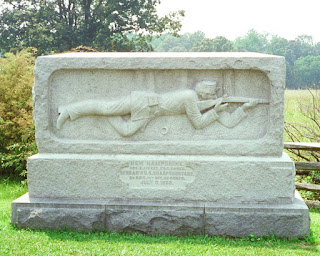May 19, 1864, the battle of Spotsylvania Courthouse ground to a surly conclusion. Grant disengaged his army from the bloody fighting with Lee and moved South, toward Richmond. He predecessors had always retreated north, licking their wounds when beaten by Lee in Virginia, but Grant simply rolled away and moved South, hoping to draw Lee out of the Wilderness and into the open. Grant had lost 33,000 soldiers and Lee 18,000. But Grant had more soldiers and his plan was simply to keep fighting Lee, not to capture Richmond but to destroy the Army of Northern Virginia.
With his army were men from New Hampshire. There had been men from New Hampshire at Gettysburg, and there were men from New Hampshire in Louisiana.
They died from measles, diptheria, hepatitis, farm boys who had no immunity to diseases found among crowds. And they died of malaria in the tropical South. Some died from bullets and explosives.
Why did they leave New Hampshire? How did so many individuals decided to sign up, to march off to war?
You see their names in the rolls and in the casualty lists: Blake, Foye, Marston, Philbrick, Batchelder, Merrill, Sanborn, Chase, Bean, Dow. Names we still see on stores, commercial trucks, street signs (what few we have here), parks.
What were they thinking?
Since the Revolutionary War, Hampton and the surrounding towns kept militias, amateur groups of men with guns who met twice a year to march around. Some went off to fight in the Mexican War, but after that enthusiasm for military adventures waned and the militias were disbanded. The Civil War brought something different: recruitment of regiments for a known war.
Slavery would have continued-- for who knows how long? -- had it not been for men from New Hampshire and other Northern states who were willing to enlist.
One can only imagine whatever lives they were leading here was not attractive enough to hold them.
We can speculate, dream, but we can never know. All we know is what they did, not why.





No comments:
Post a Comment